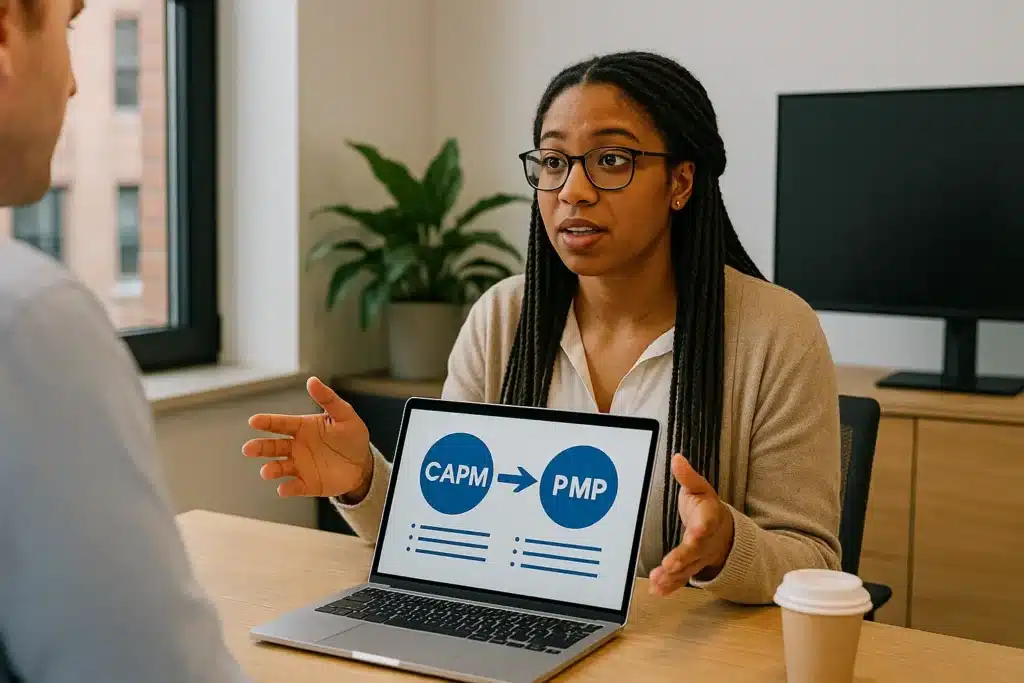Transitioning From CAPM® to PMP®: When and How to Make the Move in 2025
By: Ryan Malaluan, CAPM®; Editor: Geram Lompon; Reviewed by: Alvin Villanueva, PMP®, PMI-ACP®
Have you ever found yourself wondering, “What’s next after earning my CAPM® certification?” You’re not alone. Many
Think of it like moving from a learner’s permit to a full driver’s license. CAPM® certification focuses on
In today’s job market, timing is everything. Transition too early, and you may feel underprepared. Wait too long, and you risk missing leadership roles or higher salary potential. This guide explores the CAPM®-to-PMP® journey in 2025—covering requirements, benefits, challenges, and strategies—so you can decide if now is the right moment to become a
CAPM vs PMP: Understanding the Certification Journey
The Certified Associate in
The
PMI’s latest Salary Survey confirms PMP-certified professionals earn a 33% higher median salary than non-certified peers. This highlights the significant career impact of advancing from CAPM to PMP. CAPM focuses on
Signs You’re Ready to Move From CAPM to PMP
Transitioning from CAPM to PMP requires more than ambition—it depends on eligibility,
Signals you’re ready include:
- Meeting PMI’s Experience Requirements – With a four-year degree, you need 36 months of
project management experience; with a secondary degree or associate’s degree, 60 months are required; with a high school diploma, even more hours ofproject management experience are required. - Confidence in CAPM Knowledge – Applying
project management fundamentals in daily work means that the CAPM focuses have prepared you. - Career Goals – If leadership roles and
project management are part of your professional goals, the PMP is essential. - Employer Encouragement – Human resources teams often recommend PMP for its industry-wide benefits.
- Personal Readiness – If you feel capable of handling certification exams, it’s time to aim directly at PMP.
When these conditions align, you’re not only eligible but also positioned for success. CAPM holders who fulfill the education requirement and demonstrate proficiency in
Benefits of Earning the PMP Certification
Transitioning from CAPM to PMP certification offers significant advantages in your
Top benefits include:
- Credibility – PMP certification confirms you’re a
project management professional capable of leading projects and ensuring compliance. - Salary Potential – PMP professionals consistently earn a higher average salary compared to CAPM holders and non-members.
- Career Advancement – PMP opens leadership roles that entry-level project managers with only a CAPM certification may not access.
- Global Recognition – The PMP is a globally recognized credential, recognized across various industries and regions.
- Expanded Skills – Preparing for the PMP exam develops expertise in agile methodologies, predictive, and hybrid frameworks.
Industry-wide benefits are clear: teams led by PMP professionals report better collaboration, project compliance, and successful outcomes. CAPM certification establishes knowledge, but PMP certification equips you to lead complex projects, enhancing both your skill set and your long-term professional development.
Challenges When Transitioning From CAPM to PMP
The journey from CAPM to PMP is rewarding, but it does come with challenges. Forbes Advisor notes that the PMP exam is significantly more rigorous than the CAPM exam, requiring preparation for 180 multiple-choice questions. Additionally, balancing study with professional commitments can be challenging.
Key challenges include:
- Eligibility Requirements – Meeting education requirements and gaining
project management experience are hurdles. - Exam Difficulty – The PMP certification exams test the practical application of
project management knowledge. - Balancing Work and Study – Managing projects while preparing for exams is a demanding task.
- Cost Considerations – Exam fees, formal course options, and asynchronous course materials can be costly for non-members without PMI membership.
Solutions exist. PMI-authorized training partners offer structured courses, and many employers sponsor exam fees as part of their employees’ professional development. Strategies to succeed include:
- Building a study plan with the PMP handbook
- Leveraging your CAPM certification as a foundation
- Joining study groups for accountability
- Seeking advice from PMI members or mentors
These challenges, while real, can be overcome with persistence and structured preparation, positioning you for success in managing projects and achieving PMP certification.
Step-by-Step Guide to Moving From CAPM to PMP
A structured plan makes the transition from CAPM to PMP certification smooth and achievable. PMI emphasizes that candidates must complete 35 hours of
Steps to follow:
- Assess Eligibility – Verify
project management experience and education requirements. - Plan a Timeline – Select a PMP exam date and build a study plan.
- Apply through PMI – Submit your application via the PMI portal.
- Prepare Strategically – Use simulators, practice exams, and
project management training resources. - Leverage CAPM Knowledge – CAPM holders have a strong foundation for the PMP exam.
- Schedule the Exam – Choose a test date that fits your preparation.
- Take the Leap – Sit for the PMP exam and aim directly at success.
Best practices:
- Start small and build consistent habits
- Use either a formal course or an asynchronous course for flexibility
- Involve mentors or PMI members for accountability
- Track progress and celebrate small wins
With resources like PMI membership, the PMP handbook, and support from PMI authorized training partners, CAPM holders can confidently prepare to achieve PMP certification.
ROSEMET: Your Partner in CAPM and PMP Certification Success
ROSEMET is a veteran-led organization specializing in
Their offerings include:
- PMP exam prep courses that fulfill the required 35 hours of
project management education and align with PMI certification standards. - CAPM exam prep bundles are designed for entry-level project managers building
project management fundamentals. - Test simulators for both CAPM and PMP certifications with thousands of realistic multiple-choice questions.
- Coaching and mentorship through live office hours, community forums, and tailored professional development support.
ROSEMET provides flexible learning through self-paced, asynchronous course options, as well as structured guidance via PMI-aligned training. With a global reach that includes the U.S., U.K., Philippines, and India, ROSEMET helps candidates confidently prepare for certification exams. By combining CAPM and PMP certification preparation, they ensure project managers are equipped to lead complex projects, achieve compliance, and advance their
The Future of PMP Certification in 2025 and Beyond
The future of
Trends shaping the future include:
- Agile Methodologies Expansion – PMP Certification Exams Now Emphasize Agile and Hybrid Methods.
- AI and Automation – Tools streamline reporting and managing projects, reshaping workflows.
- Global Demand – PMP is increasingly recognized as a worldwide equivalent credential.
- Soft Skills – Human resources emphasize leadership, adaptability, and communication.
Impacts on stakeholders:
- Professionals – Expanded career goals with higher salary opportunities.
- Employers – Better project compliance and industry-wide benefits.
- Teams – Stronger collaboration under PMP professionals leading projects.
By pursuing PMP certification in 2025, CAPM holders position themselves to align with future trends in
Key Takeaways: Making the Transition From CAPM to PMP
This guide explores when and how to transition from CAPM to PMP certification in 2025, supported by insights from PMI, Forbes, and ROSEMET.
Key takeaways:
- CAPM certification establishes
project management fundamentals; PMP confirms readiness to lead projects effectively. - PMP certification requirements include 35 hours of
project management education and documented experience leading projects. - PMI confirms that PMP-certified professionals earn a 33% higher median salary.
- Forbes highlights that PMP professionals often secure six-figure salaries in the job market.
This decision shapes your
Final Thoughts on Advancing Your Project Management Career
Transitioning from CAPM to PMP is more than achieving another certification—it’s about professional development, aligning with your career path, and proving you’re ready to lead complex projects. CAPM certification validates
Consider the following steps:
- Partner with a PMI Authorized Training Partner
- Compare CAPM vs PMP certification exams to clarify expectations
- Explore training with ROSEMET for structured prep and coaching
- Test readiness with multiple-choice PMP exam simulators
When combined, the CAPM and PMP certifications create a solid foundation for a prosperous future. Are you planning the transition in 2025? Share your thoughts in the comments and join the conversation.
Thanks for reading. Until next time, continue to build your skills, pursue your professional goals, and manage projects with confidence.
References
Forbes Advisor. (2024, February 9). How to get PMP certification: An overview. Forbes Media LLC. https://www.forbes.com/advisor/education/certifications/get-pmp-certification/
Forbes. (2023, November 10). 2.5 million project managers in demand as median salaries soar to $120K. Forbes Media LLC. https://www.forbes.com/sites/rachelwells/2023/11/10/25-million-project-managers-in-demand-as-median-salaries-soar-to-120k/
Forbes Business Council. (2025, June 9). Project management training: How to build stronger project leaders. Forbes Media LLC. https://www.forbes.com/councils/forbesbusinesscouncil/2025/06/09/project-management-training-how-to-build-stronger-project-leaders/
Project Management Institute. (2023). Earning power:
ROSEMET LLC. (2025). Project management certification training and coaching. ROSEMET. https://www.rosemet.com/


